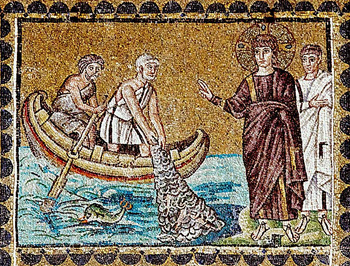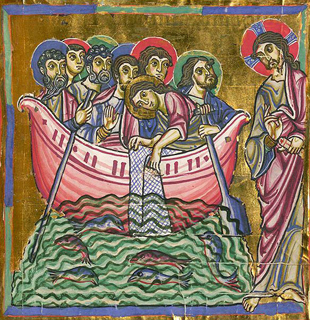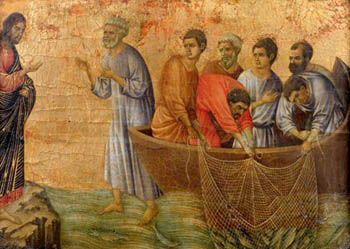For Sunday April 10, 2016
Lectionary Readings (Revised Common Lectionary, Year C)
Acts 9:1–6, (7–20)
Psalm 30
Revelation 5:11–14
John 21:1–19
I've never liked it when people ask me what my favorite Christian book is, but when pressed, I've always had the same answer across the years—the little book by Henri Nouwen called In the Name of Jesus.
The book was first published in 1989, but as I look at my worn copy, with marginalia from multiple re-readings in different colors of pen and pencil, its radical message still feels fresh. 2016 will mark the twentieth anniversary of Nouwen's death in 1996, so it's a good time to honor his story as told in In the Name of Jesus, especially since the book is based on the gospel for this week.
Nouwen, a Dutch-born Catholic priest, professor and writer, had reached the highest levels of success as a religious academic. He taught at the University of Notre Dame, and then Yale and Harvard Divinity Schools. But after twenty-five years in the priesthood, Nouwen recounts that as he was turning fifty he began to experience “a deep inner threat.”
He was praying poorly, living in isolation from others, preoccupied with being relevant, and sensing that his success had placed his soul in peril. “I woke up one day with the realization that I was living in a very dark place and that the term ‘burnout’ was a convenient psychological translation for spiritual death.”
He then made what he describes as the most important spiritual choice of his life. He left Harvard and moved to Toronto, where for the last eleven years of his life (1985–1996) he served as the residential priest at Daybreak, a home for people with severe physical and mental disabilities.
 |
|
The Miraculous Catch of Fish, Sant'Apollinare Nuovo, Ravenna, 6th Century.
|
Living among the weak, and “suddenly faced with my naked self,” was the starting point for Nouwen to discover his “true identity” as a child loved by God: “These broken, wounded, and completely unpretentious people forced me to let go of my relevant self — the self that can do things, show things, prove things, build things — and forced me to claim that unadorned self in which I am completely vulnerable, open to receive and give love regardless of any accomplishments.”
That decisive break was provoked by John's gospel for this week, which in turn formed the basis of his small book. Two gospel stories guide Nouwen’s three-part reflection: the story of Jesus’ temptations in the desert (Matthew 4:1-11), and the story of Peter’s reinstatement and call to be a shepherd (John 21:15-19).
Nouwen writes, “Jesus’s first temptation was to be relevant: to turn stones into bread.” He then challenges our drive for control, efficiency, and relevance: “While efficiency and control are great aspirations of our society, the loneliness, broken relationships, boredom, feelings of emptiness and depression, and a deep sense of uselessness fill the hearts of millions of people in our success-oriented world.”
As a counterpoint to relevance, Nouwen proposes that future leaders will be those who dare to “claim their irrelevance” and enter into solidarity with the suffering majority, bringing the light of Jesus to them as one of them.
Jesus didn't ask Peter, his successor, “Who is going to take you seriously?” “What are your metrics?” or “When will you deliver some results?” Instead, in the gospel this week, Jesus asks not once but three times, “Do you love me?”
 |
|
The Miraculous Catch of Fish, 12th Century manuscript, Salzburg.
|
Jesus’s second temptation was to do something spectacular, something worthy of hits, likes, tweets, and more followers. The Devil goads Jesus at the top of the Temple, “Since you are God’s Son, jump… They (angels) will catch you so that you won’t so much as stub your toe on a stone.” (The Message).
With best sellers like Lean In, the proliferation of TED talks, and hours of reality TV, personal branding is the new norm. It’s hard to feel “in” if you’re not pursuing audience and applause. But, Nouwen writes, “Jesus didn’t come to be a stunt man."
Nouwen proposes a new kind of leadership modeled on the servant-leader Jesus rather than power games. Peter will be a shepherd who, night and day, nourishes, gathers, rescues, restores, and needs the community as much as it needs him.
Nouwen concludes with Jesus’s last temptation — the temptation of power. He observes that “one of the greatest ironies of the history of Christianity is that its leaders constantly gave in to the temptation of power” — political, military, economic, or moral and spiritual — “even though they continued to speak in the name of Jesus, who did not cling to his divine power but emptied himself and became as we are.”
Maybe it’s because “it seems easier to be God than to love God, easier to control people than to love people, easier to own life than to love life,” observes Nouwen.
Which brings Nouwen to the gospel for this week.
Dirty, wet and tired from fishing all night and catching nothing, the disciples nonetheless followed Jesus's command to re-cast their nets one more time. The result was the miraculous catch of 153 fish. That number looks suspiciously symbolic, but there's zero scholarly agreement about what that might be.
After hauling their fish to shore, they were met by Jesus and "a fire of burning coals" (21:9). Jesus greeted them with welcoming words, "come and have breakfast."
When breakfast was over, and as they warmed themselves before the crackling fire, Jesus asked Peter not once, but three times, "Peter, do you really love me?" Three times Peter replied, "Yes, Lord, you know that I love you." And then three times Jesus responded, "feed my sheep."
This is a masterful literary stroke by John to connect two otherwise disparate stories. John says that "Peter was hurt" by Jesus's query. That's because the triple query by Jesus evoked a painful memory of a triple denial by Peter.
Who doesn't have powerful memories about standing around a fire and staring into the flames? The last time that Peter stood around a campfire was just a few days earlier, during the arrest of Jesus, when he denied three times that he even knew Jesus.
 |
|
The Miraculous catch of 153 fish by Duccio, 14th century.
|
In that incident, John describes how "it was cold, and the servants and officials stood around a fire they had made to keep warm. Peter was also standing with them, warming himself." (18:18). Both campfire conversations about faithfulness to Jesus were painful in the extreme.
But Jesus reinstates Peter three times with the words, "Feed my sheep," and despite his past failures, he went on to become the movement's leader.
But not without a zinger of a postscript. "Very truly I tell you," Jesus said to Peter, "when you were younger you dressed yourself and went where you wanted; but when you are old you will stretch out your hands, and someone else will dress you and lead you where you do not want to go.” (21:18).
This is Jesus's last word on mature leadership with Peter before commanding him to “follow me.” He tells Peter that he must be willing to be led where he would rather not go, to a place where power is abandoned in favor of love, and a space where a leader can critically discern where God is leading.
This "triple-play" query between Peter and Jesus, says Nouwen, is an invitation to vulnerability and downward mobility. They are "the words that made it possible for me to move from Harvard to L'Arche. They touch the core of Christian leadership and are spoken to offer us ever and again new ways to let go of power and follow the humble way of Jesus."
Image credits: (1) Pemptousia.com; (2) Pemptousia.com; and (3) Wikipedia.org.





